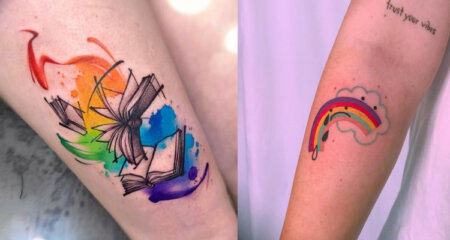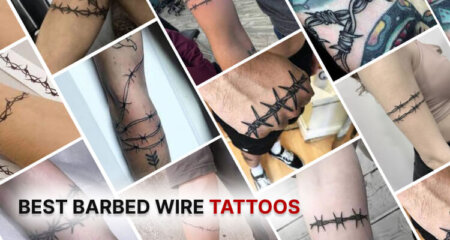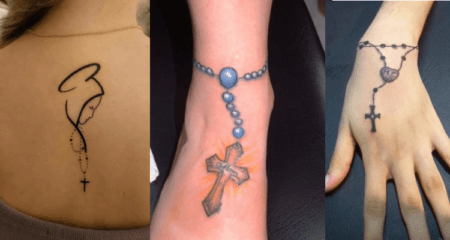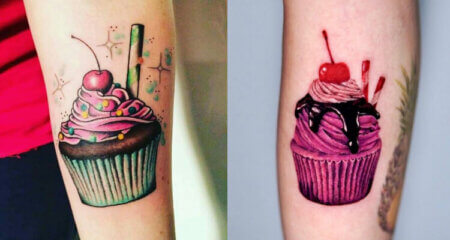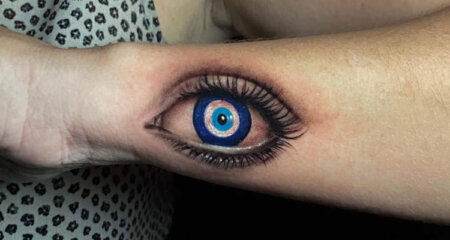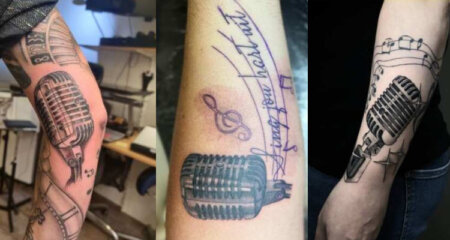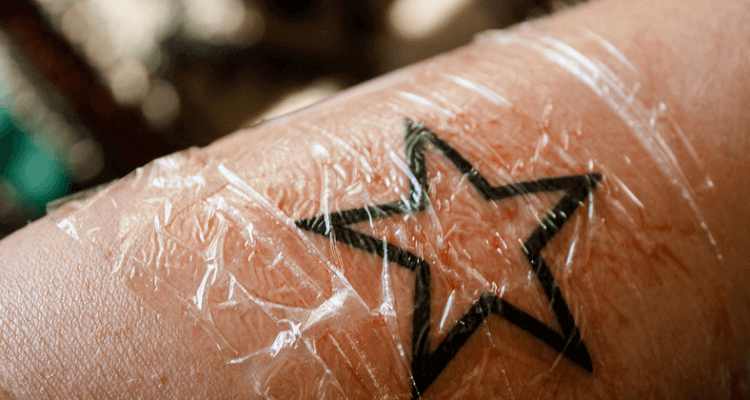
Why Do Tattoo Artists Cover a New Tattoo with Plastic Wrap?
Posted on
A tattoo is more than just a work of art and a way to express yourself. It’s no less than a medical procedure because the artist inserts the ink beneath your skin with a needle. It’s just like any other wound that needs to be properly taken care of. When you open your skin, you expose yourself to scarring and infection.
That is why it is crucial to take good aftercare of your tattoo. You must have seen artists covering newly-etched tattoos with saran wraps. Scroll down to read this post if you wonder why tattoo artists cover newly etched tattoos with plastic wrap.
Here, we will share why tattoo artists cover a newly etched tattoo with plastic wrap.
Here we go…
Table of Contents
- Why do tattoo artists cover a new tattoo with plastic wrap?
- How does wrapping a tattoo help?
- Benefits of Tattoo Wrapping
- How long should a person keep his/her tattoo wrapped?
- 18 Best Tattoo Aftercare Tips
- Prepare for aftercare by learning about it ahead of time.
- Avoid removing the wrap or bandage.
- Clean your tattoo after removing the tattoo wrap.
- Moisturize your tattoo after cleaning it.
- Check for any infection.
- Avoid direct sun exposure.
- Avoid swimming and other water sports
- Use only a small amount of water and soap.
- Spend on high-quality tattoo aftercare products.
- Avoid rubbing or picking your skin.
- Avoid scrubbing or scratching.
- Be gentle while applying ointment or moisturizer to your tattoo.
- Stay away from alcohol.
- Don’t overdo anything.
- Dress comfortably.
- Take good care of your tattoo even after it is healed.
- Get a touch-up
- Don’t miss following the aftercare instructions given by your tattoo artist.
- The Bottom Line
- Tattoo Wrap FAQs
- Q.1. How long should I keep my newly-etched tattoo wrapped?
- Q.2. Is it okay to re-wrap a tattoo?
- Q.3. How can I re-wrap my tattoo by myself?
• Why do tattoo artists cover a new tattoo with plastic wrap?
All the tattoo artists wrap a newly etched tattoo of their clients with a bandage or plastic wrap. Before they wrap, they first apply a thin layer of antibiotic ointment over the tattoo. This is to make sure that the newly etched tattoo is completely protected from dust, dirt, bacteria, harmful sun rays, etc. It also keeps the tattoo from rubbing against your clothing and becoming irritated.
Wrapping tattoos in plastic or saran wrap is a part of the tattoo care process. The biker community actually came up with the idea of wrapping tattoos in plastic. For showing their body artwork to other members, they had to lift up their bandages, which was quite a task. So one of them came up with the idea to wrap it in plastic. Since then, the practice of wrapping tattoos in plastic has been prevalent.
• How does wrapping a tattoo help?
As said earlier, a newly etched tattoo is a wound, just like any other cut or wound on your body. When you get a cut or burn, you simply use something to protect it, such as a bandage, etc. Similarly, wrapping your tattoo, whether with a bandage or plastic wrap, allows you to provide your tattoo complete protection from bacteria, dust, dirt, etc. so that it can heal properly.
The process of tattooing involves puncturing your skin with the needle(s). The artist uses a needle to push ink beneath the surface of your skin into the dermis. The area where you’re getting a tattoo gets repeatedly punctured by a needle, resulting in an abrasion wound. This fresh wound is highly susceptible to infections and other complications. That is why artists cover it with wraps after applying an ointment on it.
Mostly they use Saran wraps. Saran wraps are transparent; these wraps allow you to see your tattoo and monitor the healing process. Not only does it keep the tattoo safe while it heals, but also it will enable the piece to be displayed.
Whatever tattoo artists do, they do it for a reason. Take a look at the benefits of covering the newly etched tattoo with plastic wrap.
• Benefits of Tattoo Wrapping
As said earlier, one of the primary benefits of wrapping a tattoo is to provide it complete protection from bacteria, viruses, and germs. Here are the other benefits:
The plastic wrap acts as a wall between your tattoo and potential external infections caused by bacteria, germs, viruses, and other microorganisms.
The wrap shields your tattoo from external physical impact, which you can experience during contact sports or other physical activities.
The wrap protects your tattoo from any potential infection that you may get when in some dirty and unsanitary place.
The wrap protects your tattoo from getting distorted due to tight clothing or harsh fabric.
The wrap lets you sleep properly without snagging your clothes or causing the bedding to stick to your tattoo.
The wrap stops the bleeding and oozing, allowing you to go about your business as usual.
• How long should a person keep his/her tattoo wrapped?
So, you should keep the dressing on for as long as your tattoo artist advises. Some artists ask their clients to wear the wrap only for a few hours. Others advocate allowing it to remain until it is removed on its own. A wrap basically helps to absorb any fluid or excess ink that leaks from the tattoo.
Caring for your tattoo can help to avoid any complications, such as infection. In addition to visiting a licensed and reputable tattoo artist, you must also take care of your new tattoo at home. Here are the best tattoo aftercare tips for you.
18 Best Tattoo Aftercare Tips
1. Prepare for aftercare by learning about it ahead of time.
First and most important thing you should do while getting a tattoo is to learn how to properly care for your tattoo. Doing so will help you avoid the risk of a tattoo infection or any other issues.
After the treatment, professional tattooists usually give detailed and specific instructions on proper post-tattoo care, which you must strictly adhere to. Some artists even provide specific ointments for applying to your tattoo.
Not taking care of your tattoo may lead to various skin problems, including rashes, tattoo infections, and skin keloids. Knowing the aftercare practices in advance will help you identify a potential tattoo infection and take the necessary precautions to prevent it from occurring.
Related: Before Getting A Tattoo Checklist
2. Avoid removing the wrap or bandage.
Your tattoo artist will tell you when to remove tattoo wrapping. It is essential to keep your tattoo covered at least for a few hours. When you get home, remove the bandage or wrapping after 2 hours to allow the tattooed area’s skin to breathe. Natural air promotes faster healing.
3. Clean your tattoo after removing the tattoo wrap.
Make sure you clean your tattoo after removing the tattoo wrap. Use a mild antibacterial soap—hand soap works well—but make sure it’s unscented. After gently washing, pat dry with a paper napkin or tissue paper rather than a towel. It is critical to wash it several times per day in order to keep it clean and free of dirt and bacteria.
4. Moisturize your tattoo after cleaning it.
After you pat dry your tattoo, it is imperative to moisturize it. It is critical that you keep the area where the tattoo has been applied moisturized and clean at all times. If you do not, your tattoo will take longer to heal. Understand that when your skin adjusts to the ink, it requires moisture to settle the stretch properly.
Also See: 8 Best Lotion For A New Tattoo
5. Check for any infection.
Initially, you will notice raised skin in the tattoo area and the shape of the tattoo, giving the impression that a tattoo has been branded on your skin. Normal swelling is normal because it is caused by ink in the skin. Anything beyond that should immediately be discussed with the tattoo artist or a dermatologist.
6. Avoid direct sun exposure.
You must avoid direct sunlight exposure. Of course, staying at home all day after getting a tattoo is not technically possible. However, whenever you go out, make sure your tattoo is properly covered so that it is not directly exposed to the sun.
7. Avoid swimming and other water sports
It is crucial to avoid swimming and other water games for at least 6-8 weeks when you have a new tattoo. It is because most swimming pools have chlorine water, and if you go to the sea, it will have saltwater. Swimming in chlorine and saltwater can severely damage your tattoo. Hence, it is good to avoid both.
8. Use only a small amount of water and soap.
Make sure that no water or soap comes into contact with the tattoo area for the first few days. Make sure you use a warm washcloth to clean your tattoo. Do not over clean your tattoo; otherwise, you will end up with faded artwork, which is not a good thing.
9. Spend on high-quality tattoo aftercare products.
For a minimum of four weeks, you should avoid using any alcohol-based or chemical-based products on or near the tattooed area.
There are a plethora of fancy tattoo aftercare products on the market, but in general, basic soap and moisturizer work just as well. Make sure to wash and moisturize your tattoo at least twice a day. Continue washing and moisturizing until the scabbing stops. Only use tattoo aftercare products that are chemical-free, odor-free, and mild.
10. Avoid rubbing or picking your skin.
Most people tend to forget things, especially the newly etched tattoos. After taking a bath, people forget they have a tattoo and begin rubbing the area carelessly, which is not a good idea. Know that rubbing your tattoo will damage or negatively affect it. So, make sure you don’t rub or pick your newly etched tattoo.
11. Avoid scrubbing or scratching.
It’s normal to feel itchy after getting a tattoo, and it happens to almost everyone. And it’s nearly impossible to fight that feeling. However, it is necessary to avoid scratching your tattoo. Scratching your tattoo can cause it to become distorted on your body. As a result, it is critical to keep your skin moisturized at all times.
12. Be gentle while applying ointment or moisturizer to your tattoo.
Make sure to apply the ointment to and around your tattoo gently. Rub the area in soft, circular motions until it is completely covered.
13. Stay away from alcohol.
Even if you want to celebrate your artwork, please hold off for at least two more days. After two to three days, you may consume alcohol. A two-day delay will have no effect on your celebration; in fact, it will be better because you will be able to enjoy it even more!
14. Don’t overdo anything.
To hasten the healing process, some people literally overdo things. If you’re also tempted to hasten the process and tend to rub alcohol, Vaseline, or antibiotic ointments for that, STOP DOING IT RIGHT AWAY! Rubbing alcohol dries out the tattoo, whereas Vaseline and other ointments can trap dust and dirt, which can lead to infection.
DO YOU WANT THAT???
Presumably, NO! So, don’t overdo anything. It’s for your good and for the good of your tattoo!!
Also Read: Can I Use Vaseline On A New Tattoo?
15. Dress comfortably.
When your tattoo is healing, it is critical that you wear loose clothing. Tight clothing can cause a faded or distorted tattoo design during the healing process.
16. Take good care of your tattoo even after it is healed.
Keep your tattoo in good condition all the time. Even after your tattoo has healed, you must take good care of it. The brighter your tattoo will become over time, the healthier your skin will be. Use only skin-friendly products on your skin and avoid using harsh products.
Don’t take the tattoo healing lightly. In case of tattoo infection, contact your tattoo artist or dermatologist right away. Allow your tattooed skin to breathe as well. Keep your tattoo clean at all times. Also, when going out during the day, cover your tattoo. All of this will ensure that your tattoo remains healthy and fresh for all your life.
17. Get a touch-up
Consider getting touch-ups if your tattoo fades even after proper care. Many tattoo parlors guarantee their work, and you can get a free touch-up. However, if you do not follow their aftercare instructions and they discover it, you will be charged for the touch-up.
18. Don’t miss following the aftercare instructions given by your tattoo artist.
Finally, if you don’t want to be contrite later, make sure to follow the aftercare instructions provided by your tattoo artist. Some professionals recommend specific aftercare creams or lotions; if your artist has also suggested some, make sure you use them. Know that your tattoo artist understands what is best for your skin.
People are sometimes influenced by their friends to buy cheaper products or just ignore the advice of their artists. This is not a good idea; instead, put your trust in your tattoo artist. They are knowledgeable professionals who have tried and tested a variety of aftercare products before recommending them to their clients. And if you want to use other products, discuss them with your tattoo artist before buying.
The Bottom Line
That’s all for now! This article should have been informative and helped you understand why tattoo artists cover newly etched tattoos with plastic wrap. Also, don’t forget to follow the tattoo aftercare instructions listed above. Following these guidelines will prevent your tattoo from fading and ensure that it remains vibrant at all times.
If you want your tattoo to look brighter and vivid all the time, you must take good care of it. A faded tattoo is the last thing that anybody would ever want. Faded tattoos do not look good at all, especially when they are easily visible. They can have a significant impact on your mood. So, it’s best to listen to your tattoo artist’s instructions and do as he says.
Tattoo Wrap FAQs
Q.1. How long should I keep my tattoo wrapped?
Wrapping your tattoo is an essential component of proper aftercare. After leaving the tattoo parlor, keep your tattoo wrapped for at least 2-4 hours. If your artist has used protective tattoo film instead of plastic foil, wrap it around your tattoo for 3-4 days.
Q.2. Is it okay to re-wrap a tattoo?
Normally, you don’t need to re-wrap a tattoo. However, if it is vital, it is best to consult with your artist. Some tattoo artists recommend re-wrapping your new tattoo with cling film or plastic foil.
This, however, is highly debatable. Many people believe that tattoos should not be wrapped in plastic foils in the first place, while others believe that it is okay to re-wrap a tattoo in plastic foil.
Many tattoo artists advise re-wrapping a tattoo with a sterile bandage or a cheese/muslin cloth (if it is indispensable). There are also many medical-grade tattoo wrappings on the market. These wrappings were created with proper hygiene and sanitation in mind. You can think about using them, but make sure to check with your artist first.
Q.3. How can I re-wrap my tattoo by myself?
Of course, re-wrapping a tattoo is not a breeze. Your tattoo artist does the first tattoo wrapping – for them, it’s a cakewalk. But for you, it’s not going to be easy. But with the tips below, you can do it effortlessly.
Find a clean and sterile place in your home. The first thing that you should do to re-wrap your tattoo is to find a clean place.
Wash your hands thoroughly with good antibacterial soap. Make sure you wash your hands thoroughly before you re-wrap your tattoo. Use only medicated or good-quality hand wash or soap for cleaning your hands. Also, do not touch anything after cleaning your hands.
Now clean your tattoo with lukewarm water and mild, antibacterial, gentle, and fragrance-free soap. After you’ve cleaned the tattoo, pat dry it with a paper towel.
Once you’re done with cleaning and drying your tattoo, it’s time for the final step. Take the wrap and apply it to the tattoo. Ensure the wrap covers the tattoo completely and that the adhesive adheres to the skin surrounding the tattoo rather than the tattooed skin.
Thanks for reading this article!
Happy Tattooing… ☺ ☺

